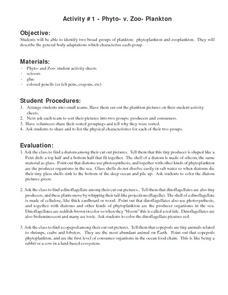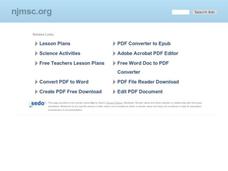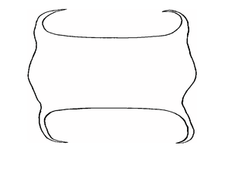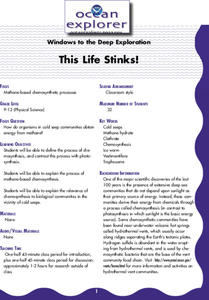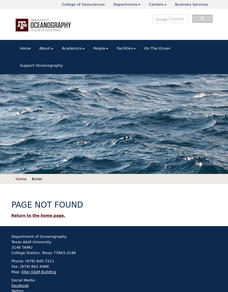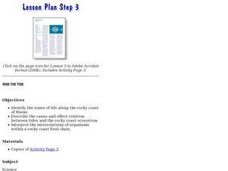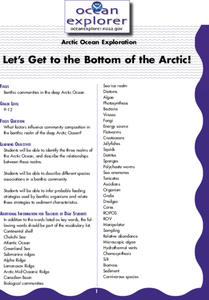Curated OER
Living in Extreme Environments
Pupils examine the characteristics of the ocean floor and the importance of of extreme environments. In this investigative lesson students use four methods to sample populations, gather, record and analyze data from a scientific...
Curated OER
Let's Go to the Video Tape!
Students examine biological diversity and see how it relates to the concepts of variety and relative abundance. In this investigative lesson students view a video on biodiversity and complete an activity.
Curated OER
Twisted Vision
Students investigate the vision adaptations in marine animals in their environments. In this life science lesson, students use polarized filters and make observations. Students explain how the adaptation of polarized vision is an...
Curated OER
The Water Cycle
When homeschooling parents and children tackle the water cycle, the results can be a fascinating exploration of our environment.
Curated OER
The Ocean
Plant and animal life of the ocean is the focus of this science lesson. Young scientists sort a variety of seashells and explore why many sea animals have shells. They examine the shells, write journal entries highlighting the...
Curated OER
The Wonders of Bacteria
Young scholars explore the evolution and features of bacteria through a series of activities. In this biology lesson plan, students collect data and graph bacterial growth. They design a brochure about bacteria's role in society.
Curated OER
Phyto- v. Zoo- Plankton
Students identify two broad groups of plankton: phytoplankton and zoo plankton. They describe the general body adaptations which characterize each group. They discuss and write about what it would be like to be carried around by the...
Curated OER
Twisted Vision
Students explain polarization vision and why some animals have it while others do not. They examine the reasons why it would be helpful for marine organisms to have polarized light.
Curated OER
Skates
Students gain understanding of structure, characteristics, and basic needs of living things and their role in world, identify parts of skate, observe details of skate's body and skate egg case, and identify unique characteristics of skates.
Curated OER
How would an oil spill affect a Marine Sanctuary?
Students explore the concept of environmental stewardship. In this science lesson, students discover how scientists assess damages to the environment following oil spills. Students conduct a simulation of a public meeting in order to...
Curated OER
The Open Ocean, What is it and How Does it Change?
Students investigate the ocean environment. In this ocean lesson, students discover the physical properties of the ocean. Over two days, students work in small groups investigating ocean maps and creating water currents.
Curated OER
This Life Stinks!
Young scholars explore the process of chemosynthesis and contrast this process with photosynthesis. They consider the relevance of chemosynthesis to biological communities in the vicinity of cold seeps.
Curated OER
Goals of the Diversity of Life Unit
Students are introduced to the unit on the importance of diversity of life and the role that interdependence plays in our worlds. this is part of a multi-lesson unit on the diversity of life.
Curated OER
All That Glitters...
Students study that white light (visible light) is comprised of all colors of the spectrum. They study that the quantity of light decreases with increasing depth in the ocean. They study that the quality of light changes with increasing...
Curated OER
Biomes
In this biomes worksheet, students review the characteristics of aquatic biomes and terrestrial biomes. This worksheet has 12 fill in the blank, 6 multiple choice, and 4 short answer questions.
Curated OER
pH
Learners use a Colorimetric test to measure pH and gain the importance to life in an aquatic ecosystem pH is. They explore the dramatic effect pH level can have on a water body. Students test the pH level of many water samples.
Curated OER
Immersion Presents Monterey Bay
Students study Monterey Bay. In this Monterey Bay lesson, students create a model of upwelling around Monterey Bay. Students simulate surface water movement relative to prevailing winds.
Curated OER
Fisheries
Students research and report on the ocean's problems of disappearing or diminishing species around the world. students examine ecosystems and food chains and present their findings to a mock panel of science experts.
Curated OER
Feeding in the Flow
Students examine current flow and describe ways in which it may effect food of reef building corals. In this coral lesson students identify two environmental factors that may affect the morphology.
Curated OER
Ride the Tide
Students examine the cause-and-effect relationship between tides and the rocky coast ecosystem. They complete a worksheet that illustrates the intertidal zone.
Curated OER
Ocean Vocabulary
In this vocabulary worksheet, students match words related to the ocean to their definitions. Worksheet is labeled as a quiz, but may be used as review/practice.
Curated OER
Easy as Pi
Students examine structural features. In this life science lesson students complete an activity and quantify the impact of various modifications.
Curated OER
Let's Get to the Bottom of the Arctic!
Students identify the three realms of the Arctic Ocean, and describe the relationships between these realms. They describe different species associations in a benthic community.








